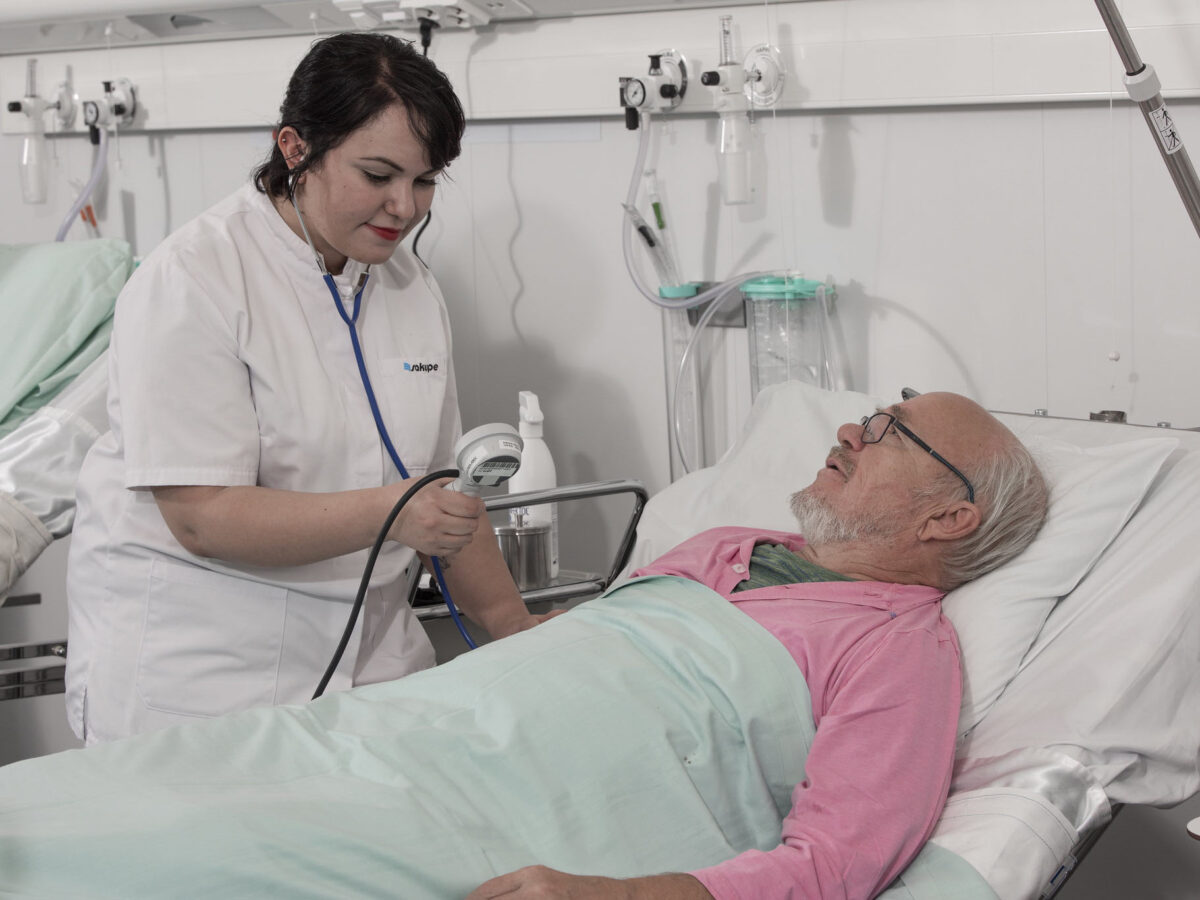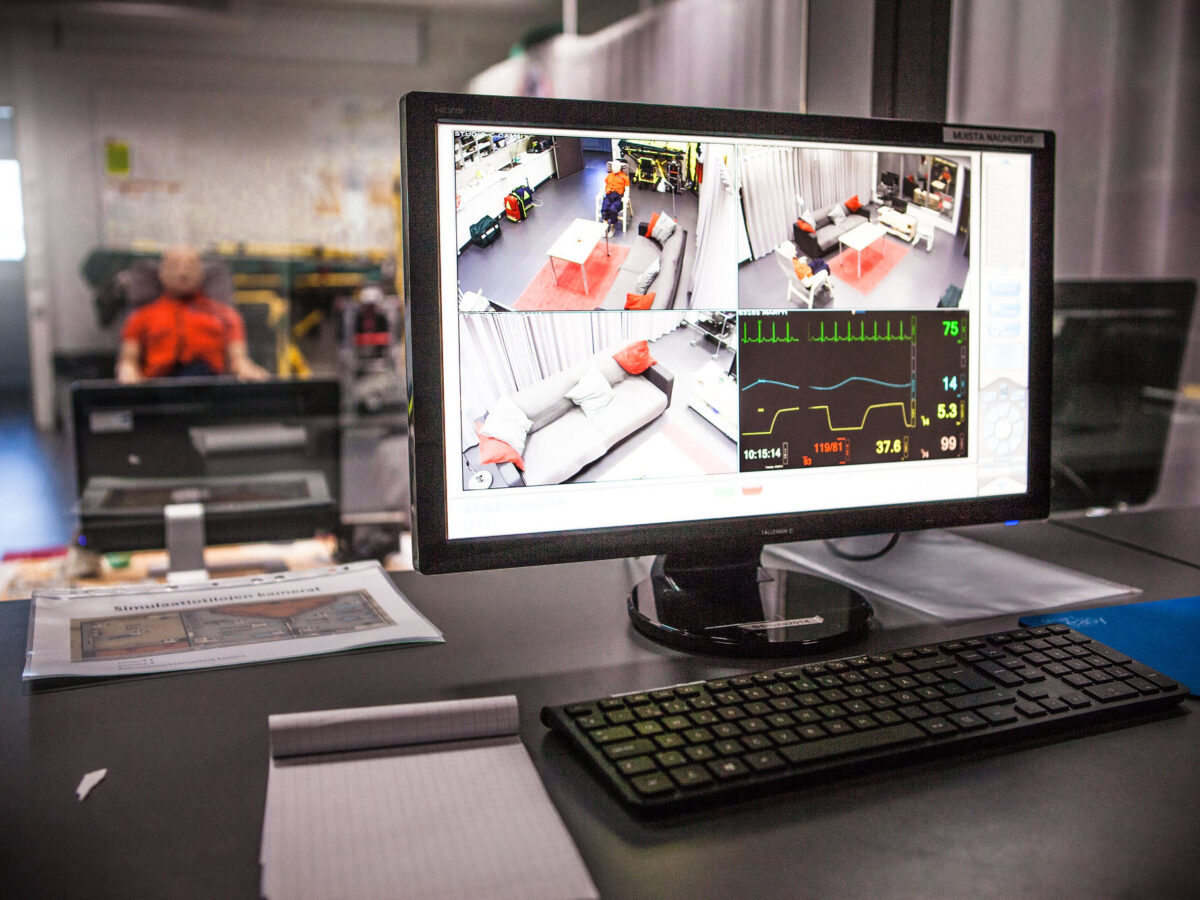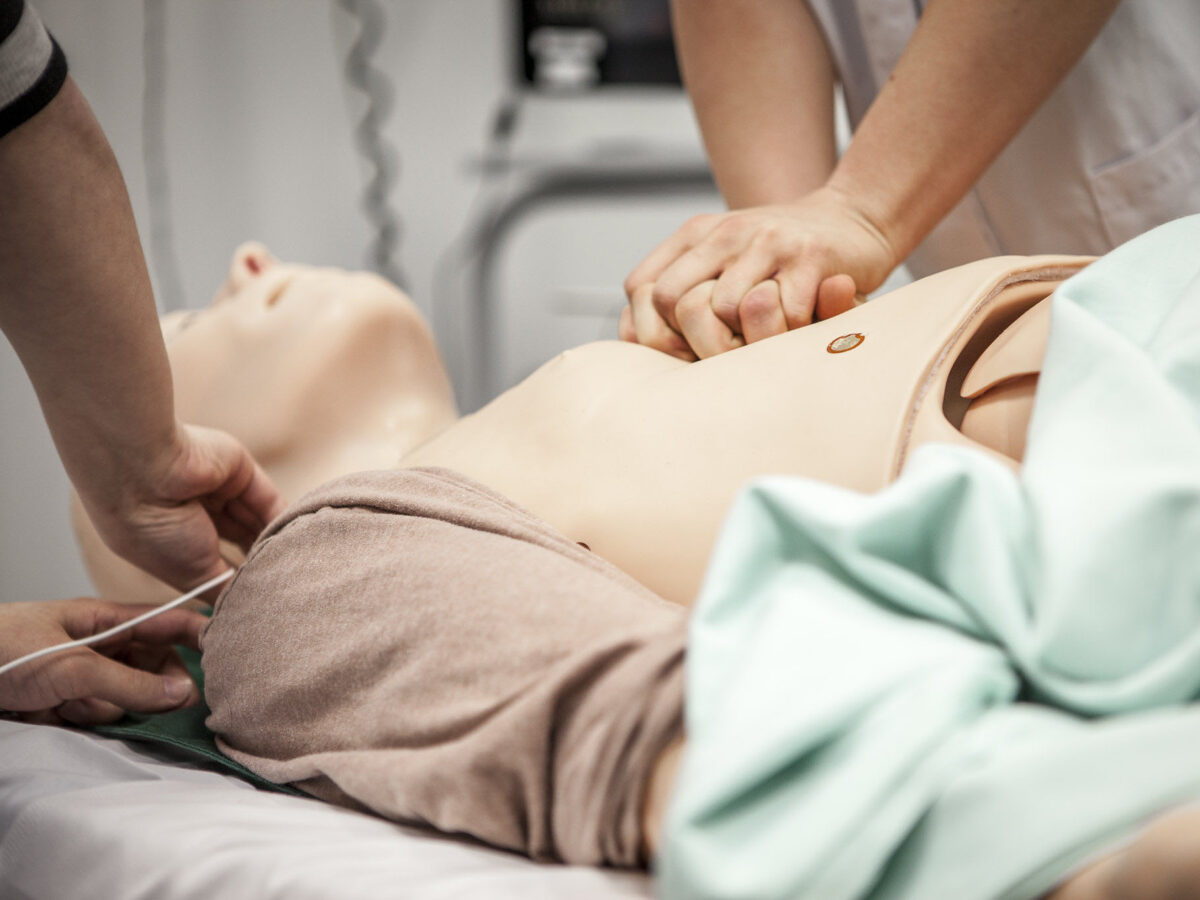Registered Nurse
Bachelor of Health Care
- Home
- Study with us
- Degree studies
- Bachelor’s in English
- Registered Nurse, Bachelor of Health Care
Become a competent and highly skilled registered nurse with our Nursing programme
NEXT APPLICATION PERIOD: 5-19 January 2022
Degree programme: Registered Nurse
Degree title: Bachelor of Health Care
Duration: 210 ECTS, 3.5 years
Study mode: Full-time studies
Study place: Microkatu campus, Kuopio, Finland
Language: English
Annual intake: 25
The Bachelor of Health Care, Registered Nurse programme aims to develop competent and highly skilled nurses with an excellent knowledge of encountering, supervising and caring for people with diverse health issues. This degree programme provides you with extensive knowledge of nursing.
During your studies, you will master the required concepts, methods and skills to enable critical assessment and decision-making in changing and unpredictable nursing situations. You will also learn how to be in charge of professional work and projects, and how to work in expert jobs within the nursing field. Moreover, you will be capable of assessing your own skills, and the skills and development of other people and teams. You will confidently be able to apply, assess and analyse your nursing skills in different situations.
Similarly, you will be able to coordinate the work and to work independently as a nursing expert in your home country and abroad. With our programme, you will be prepared for lifelong learning and have the ability to communicate verbally and in written form with different audiences in and outside the field of nursing.
Our Registered Nurse programme offers a multi professional learning environment in modern facilities with a simulation centre, clinical skill laboratories, and health technology. The studies are implemented in a blended manner combining personal tutoring, e-learning, and clinical nursing practises aimed at deepening your multi professional evidence-based care.APPLY TO THIS PROGRAMME!CURRICULUMELIGIBILITYGENERAL ADMISSION PROCESSTUITION FEESDOWNLOAD THE FLYER
Programme Highlights

Internships
Nursing students have several internships throughout the whole duration of their studies, starting already from the first year.

Simulation centre
Our simulation centre enables students to apply and show their skills and knowledge in a safe and controlled environment.

Clinical skill laboratories
The clinal skill laboratories support the continuous development of the students’ nursing skills.
Choosing a major or specialisation
The degree consists of 180 ECTS of common studies and 30 ECTS of alternative studies.
At the final stage of the studies, you can choose 30 ECTS of alternative professional studies. The study modules include, for instance, Mental Health and Addiction Care in different environments, Clinical Nursing of Medical Patients in different environments, Perioperative Nursing in different environments, and Acute and Intensive Care Nursing.
You can also include courses in foreign languages and entrepreneurial courses into the alternative studies. The training periods will also serve as an opportunity to develop your entrepreneurial skills.
Content of studies
The degree studies are full-time studies and attendance is required in part of the courses. The study methods include contact lessons, distance and independent studies, e-learning, internships, and RDI work. Internship periods are full-time studies and attendance is required.
We use versatile methods in our education, such as, skills workshops and simulations. The guiding principles in nursing education are intercourse between theory and practice, contact lessons and independent studying both by oneself and in teams as well as learning in different expert cultures. The student takes an active role in the studies.
During the first year of your studies, you will learn to observe a human being as a psychophysical entity and you will learn the basics of nursing. You will learn to use the nursing values and principles to enhance health and functional ability as well as in nursing medical patients.
During the second year, you will learn to use evidence-based information in the medication of the most common diseases and in perioperative nursing. Perioperative nursing covers nursing before, during and after surgical operations. During the training periods, you will learn to apply and expand knowledge of nursing children, adolescents and families as well as of mental health and addiction care.
During the third year, you can apply and analyse information on ageing and the clients’ needs and you can implement nursing in different environments. You will be able to assess the development needs in nursing as well as plan and implement solutions to renew and develop nursing. You will also be able to apply the RDI skills you obtained during your studies when planning and writing your thesis.
During the final year of your studies, you will be able to apply, assess and analyse your nursing skills in different fields, to coordinate your work and to work independently as a nursing expert in an international environment. You will have the ability to communicate both verbally and in writing with different audiences in and outside the field of nursing.
The content of nursing studies start with becoming familiar with nursing and proceed to applying the nursing skills in different patient work situations, for example, patients at different ages and with different diseases. Your skills are developed and deepened during the study process.
Programme structure
The extent of the Degree Programme in Nursing is 210 ECTS. You are expected to complete 60 ECTS during each study year; this means 1600 hours of student work.
The courses in the curriculum constitute wide modules; they are not separate but support the student’s overall development and the development of his or her expertise. Consequently, teaching and work-based RDI are combined during the process.
FIRST YEAR: Building Professional Nursing Identity 60 ECTS
- Basics of Nursing
- Basics of Nursing Knowledge
SECOND YEAR: Developing Professional Skills 60 ECTS
- Strengthening Nursing Knowledge
- Expanding Nursing Knowledge
THIRD YEAR: Deepening Professional Nursing Knowledge 60 ECTS
- Deepening Nursing Knowledge
- Developing Nursing Expertise
- Passing the national exam for the generalist nurse’s core competences
FOURTH YEAR: Applying Professional Knowledge 30 ECTS
- Applying professional nursing skills in different areas of operation
Click here to access the full Registered Nurse curriculum.
Qualification
The National Supervisory Authority for Welfare and Health (VALVIRA) grants licensing, upon application and upon the announcement of the UAS, to practice nursing as a licenced professional. The professional qualification of a nurse and the education of a nurse working in general nursing are regulated by the directive 2013/55/EY of the European Parliament and of the Council as well as by the European Qualifications Framework, 2006.
Student selection
Study places: 25
Eligibility to apply
Tuition fee
Students are selected on the basis of the online entrance examination “International UAS Exam”, which is common to UASs.
International UAS Exam
International UAS Exam consists of two phases:
- First phase – written exam on 9 February 2022
- Second phase – group interview between 2 – 16 March 2022
In the entrance examination, the applicants’ readiness for UAS studies are assessed. The entrance exam does not include any advance reading materials or pre-assignments.
More detailed information on the International UAS Exam can be found at UASinfo.fi.
Special arrangements in the International UAS Exam
If you have special needs that should be considered when participating in the International UAS Exam, you can apply for special arrangements. Please read further information and instructions at UASInfo.fi.
Health requirements and aptitude
Legislation relating to aptitude
Legislation applies to education leading to a degree in applied sciences in the field of health care and social services, the humanities, physical exercise and maritime navigation. These fields have requirements concerning the safety of minors, patient and customer safety or traffic safety which restrict student admission.
In the field of health care and social services the studies include working with customer groups requiring special protection, in which case ethical requirements and requirements for patient or customer safety are crucial. The health and functional capacity of students shall be such that they are capable of performing assignments and practical training related to their studies.
Those applying to the field should bear in mind that:
- studying and working in a profession of this field requires sufficient physical, mental and social capacity
- the field of health care and social services is not suitable for individuals convicted of one of the following: offences against children, sexual offences, violent offences, crimes against freedom, or drug offences
- the field is not suitable for those who have been drug or alcohol abusers during the last two years
- conditions such as musculoskeletal diseases, chronic skin diseases, allergies and mental health disorders may lead to health issues during studies or later on in working life
- blood-borne illnesses may restrict practical training and, after graduation, the students’ placement in work assignments
- many health care and social services operating units care for patients/clients susceptible to infections, and in order to work at these units, students and staff must have up-to-date vaccination cover (e.g. measles, chicken pox, whooping cough). In addition, annual influenza vaccination is required. The required vaccinations are free of charge for students in the field of health care and social services.
Applicants are required to provide information concerning their health status and functional capacity as required to assess admission at the request of the university of applied sciences concerned, as well as information on any possible prior decision on cancellation of their study entitlement.
Students are required to produce an extract from criminal records at the request of the university of applied sciences if working with minors forms an essential part of the tasks assigned to them during their studies or work placement periods that are part of their studies.
Universities of applied sciences are entitled to require a student to produce a certificate of a drugs test if there is any reason to suspect that the student is under the influence of drugs during practical assignments or during a work placement that is part of their studies, or that the student is addicted to drugs.
Career possibilities
You can work as a nursing expert eg at health clinics, in hospital wards and home care services. In addition, care and health care companies, special health care outpatient clinics, wards and operating theatres as well as mental health clinics can be your future employers. You can also have an international career or become an entrepreneur.
Internationality
You can study international issues and develop your intercultural skill at different stages of your studies both at Savonia UAS in a multicultural environment and at our foreign partner universities. In addition, you can improve your intercultural skills by being a peer tutor student and/or by hosting our foreign exchange students.
Our exchange partners are eg in Australia, Austria, Belgium, Canada, China, India, Kenia, Mozambique, Namibia, Slovakia, Slovenia, Spain, Thailand and the UK.
Cooperation
At Savonia UAS we implement OIS (Open Innovation Space) where high-quality learning and teaching are combined with work-based RDI. The student is active and works in different premises, groups, communities and eLearning environments. Students from different fields, teachers and people working in RDI together with representatives from the working life work on different types of assignments and solve various practical problems. Part of the studies is completed by working in various work-based projects.
Research
At Savonia UAS we have assigned RDI focus areas. The Degree Programme in Nursing focuses on applied welfare technology.
Possibilities to continue studies after graduation
Different types of additional, further and continuing education and training support can enhance your nursing career development. After gaining two years of work experience, you can continue your studies at a UAS and complete a Master’s degree there. Universities also provide possibilities for further education.
Language of instruction
The whole programme is conducted in English. In addition, Swedish (for Finnish students) and other foreign language courses are also included.